Sir John Monash, Personal Files Book 2, 23 February - 31 March 1915, Part 9
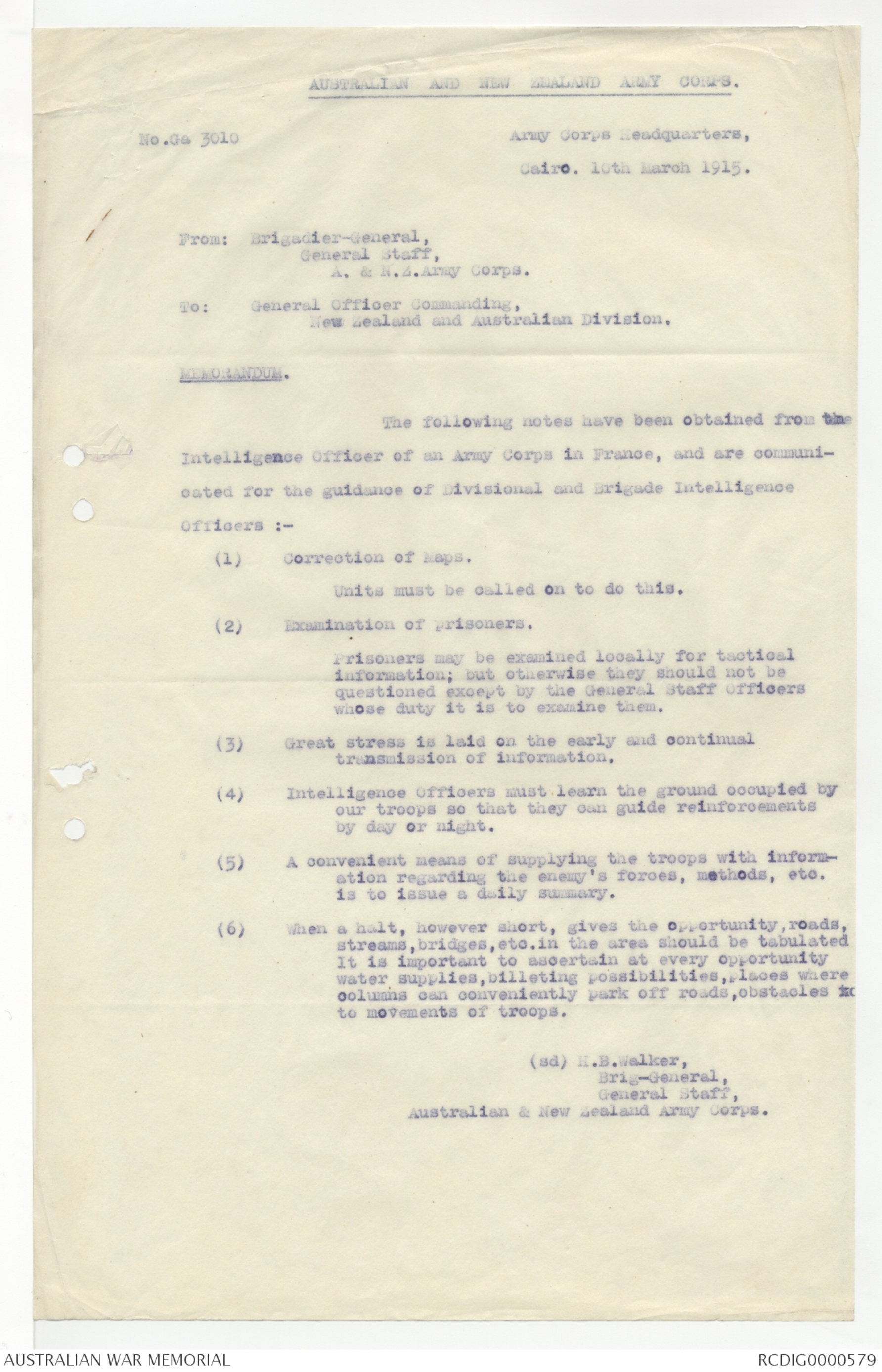
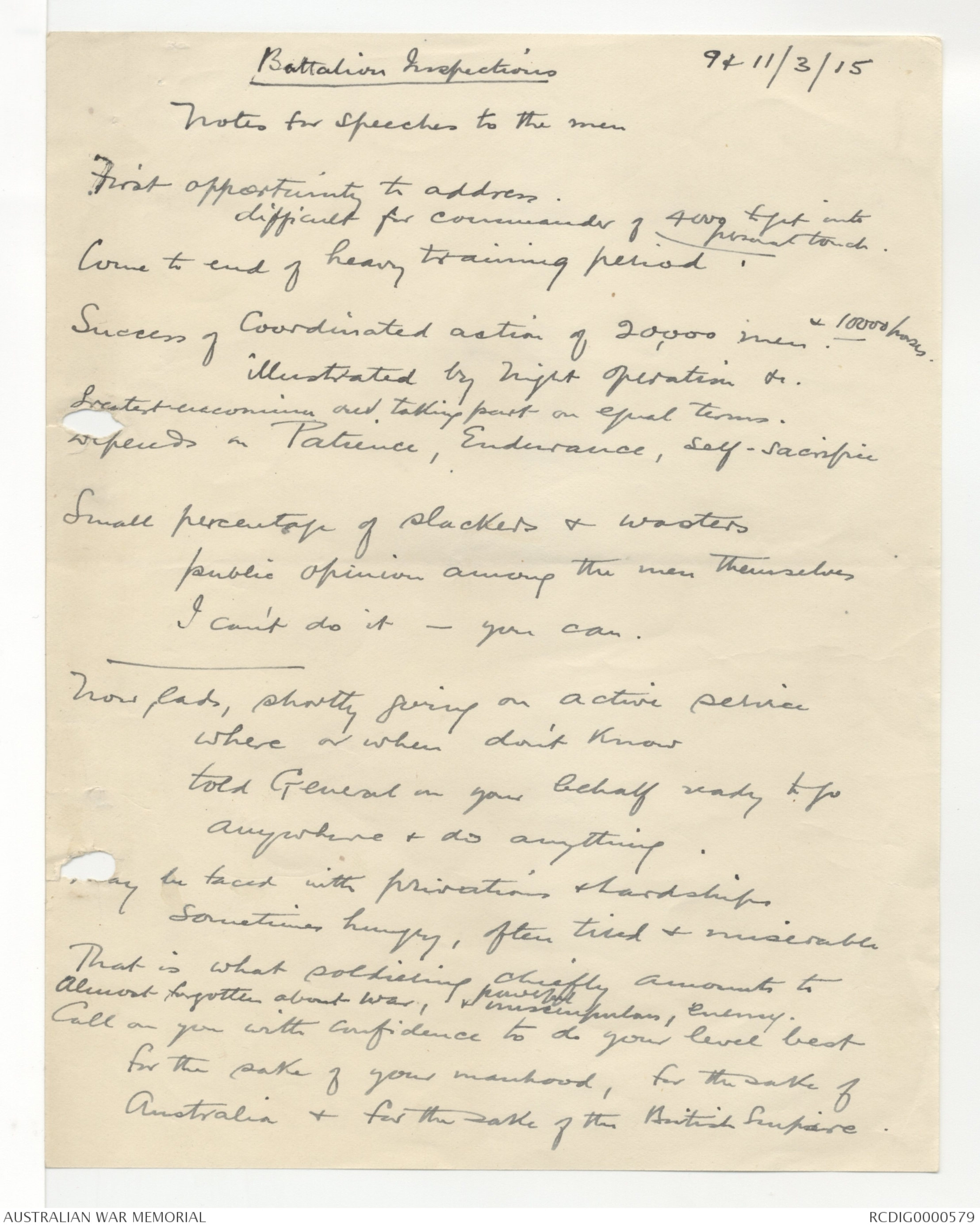
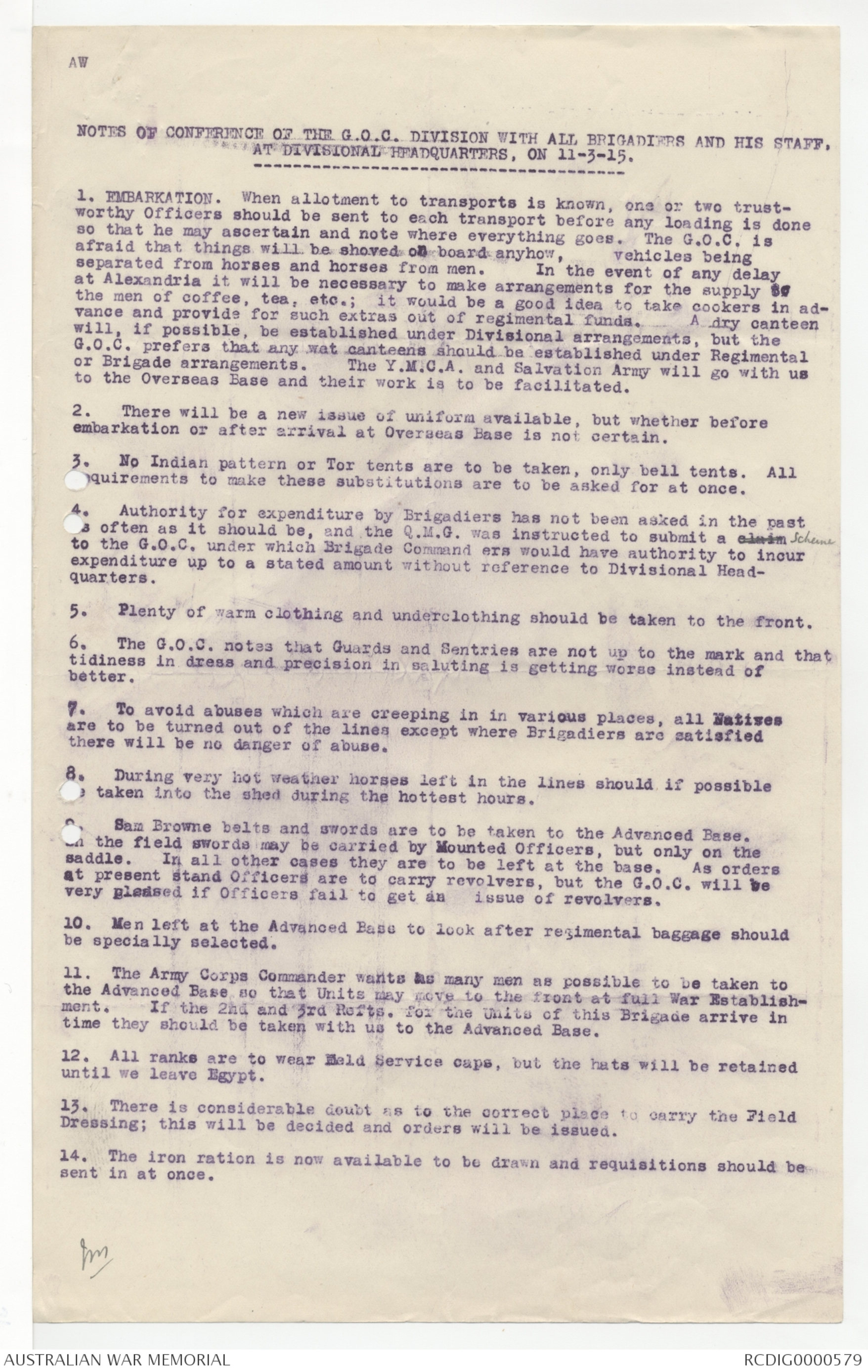
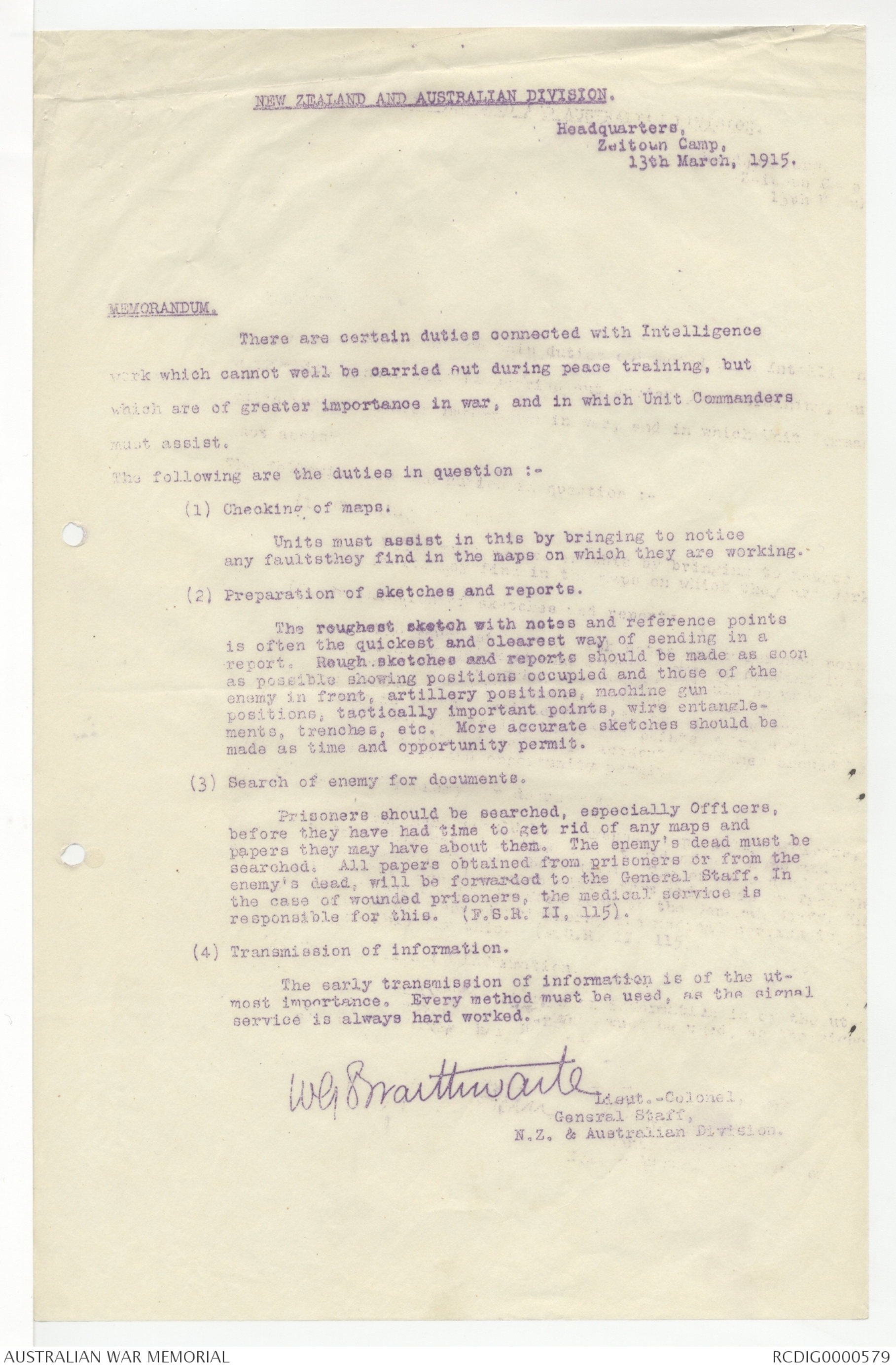
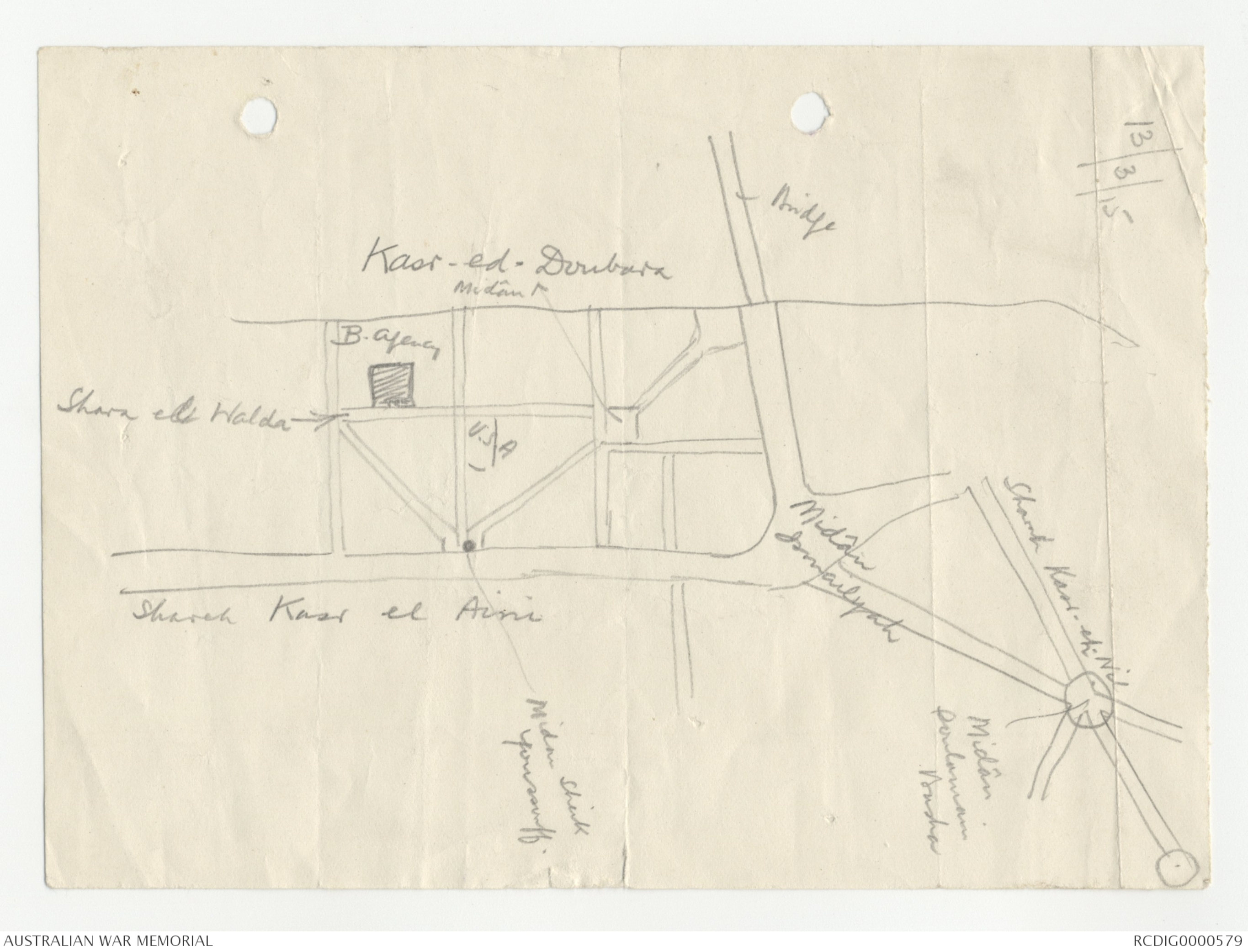
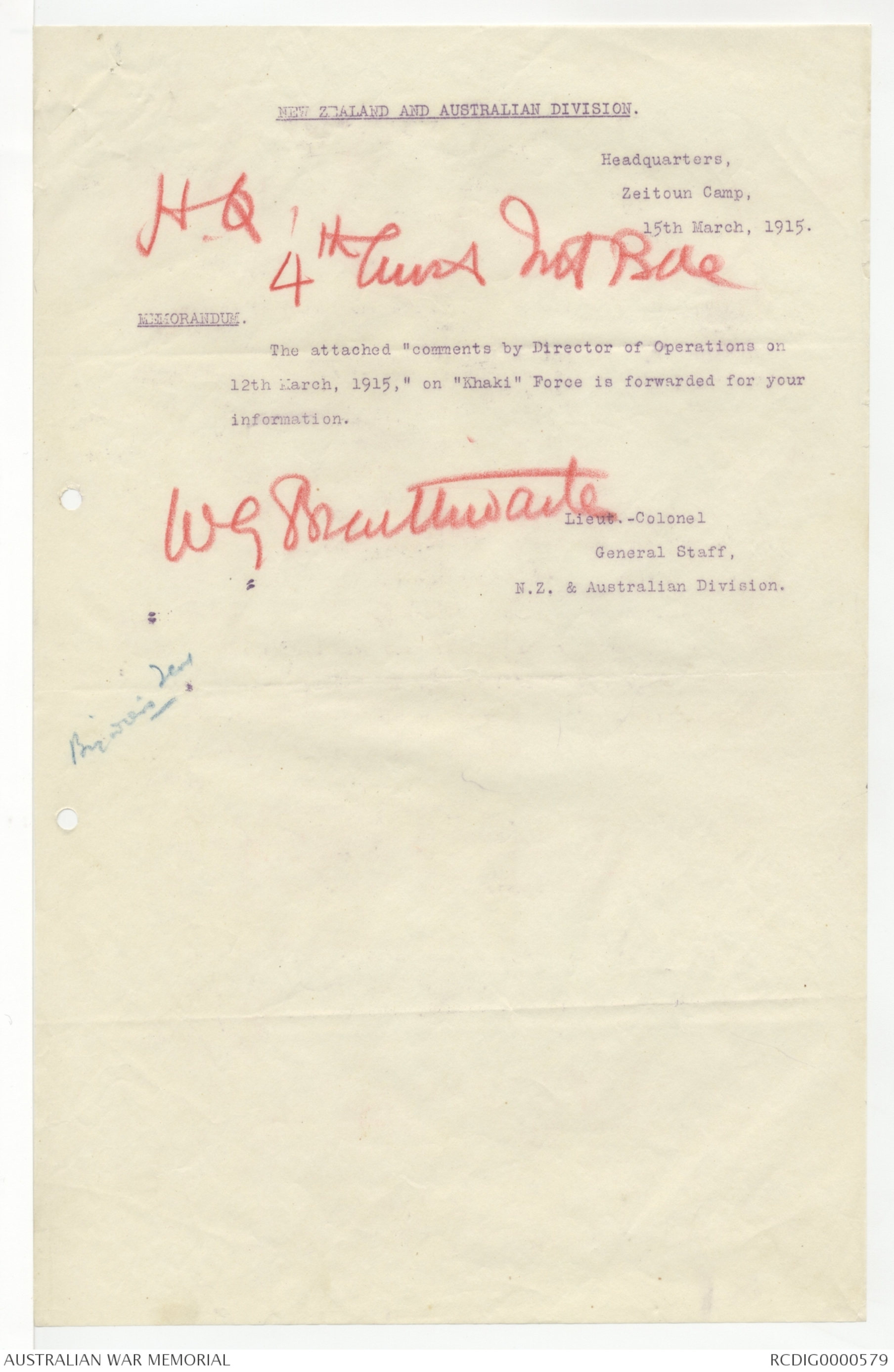
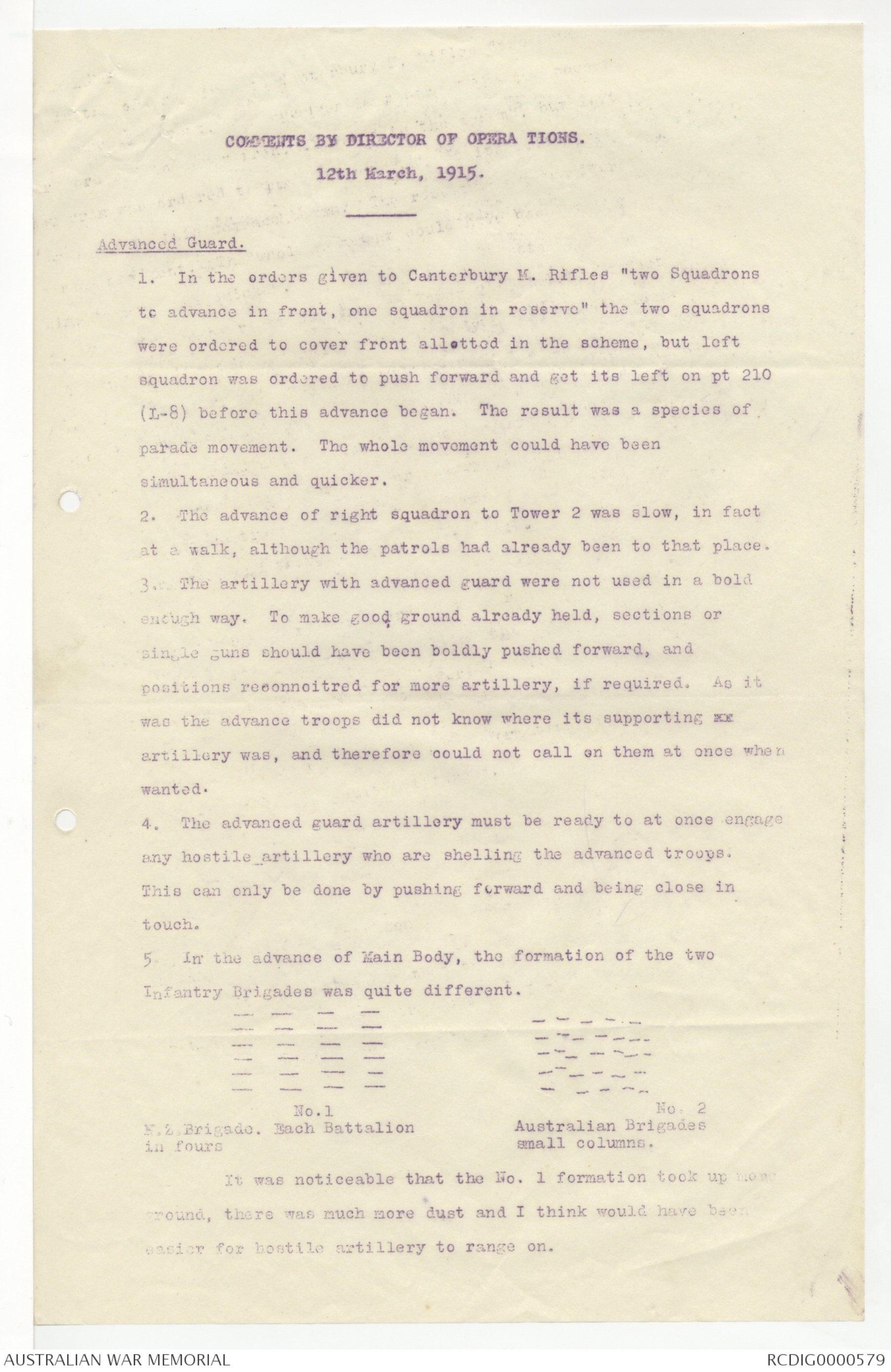
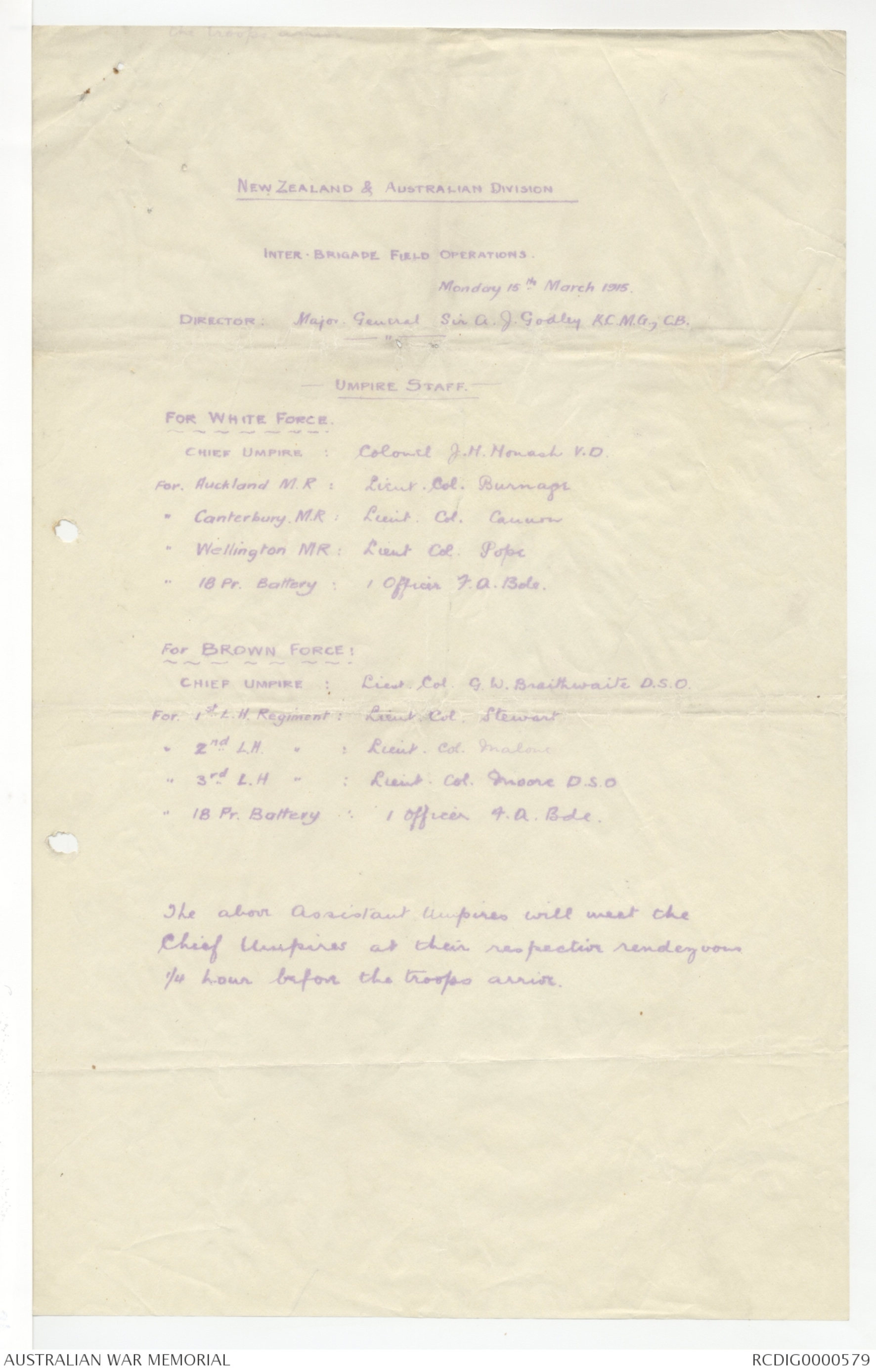
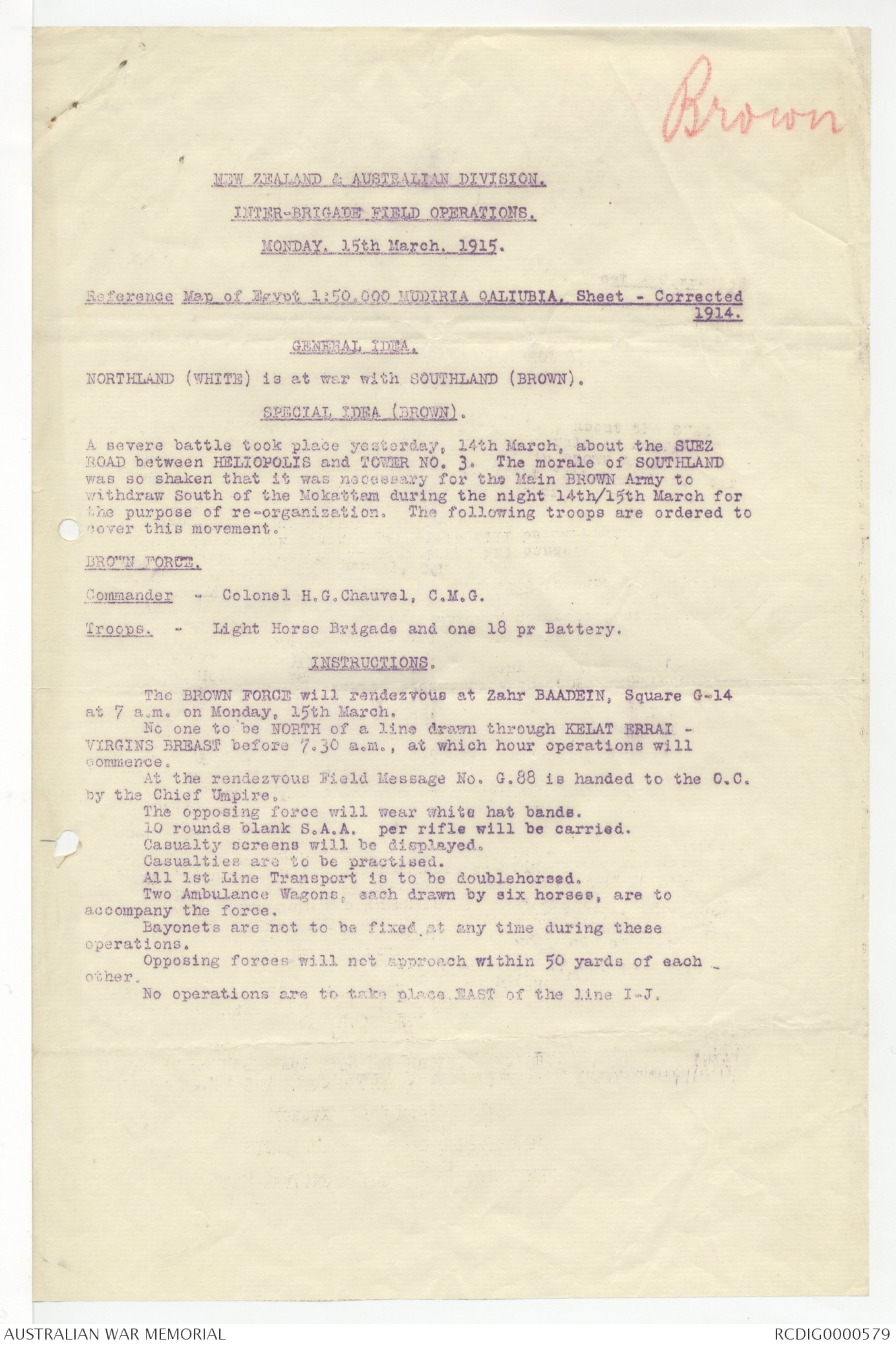
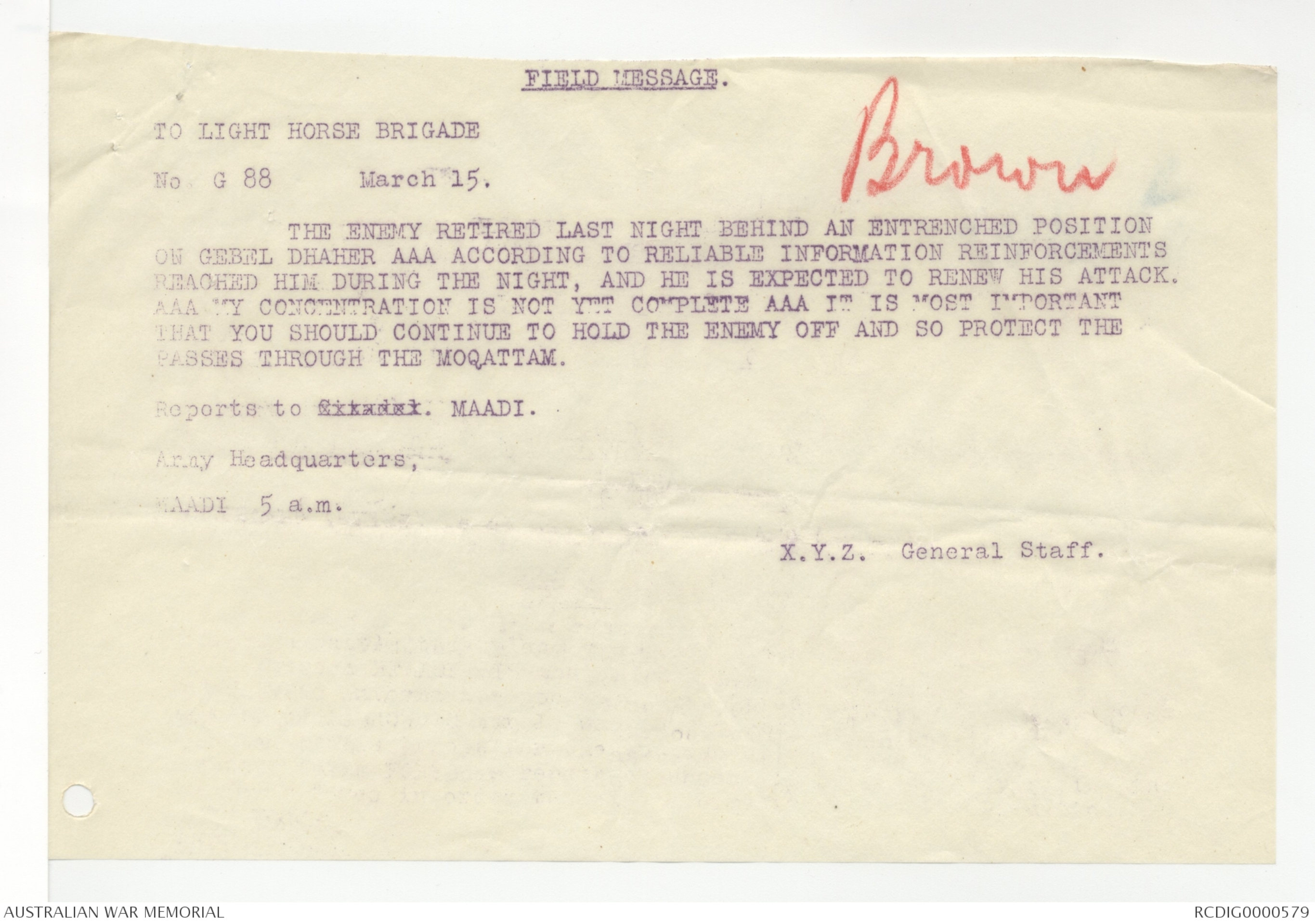
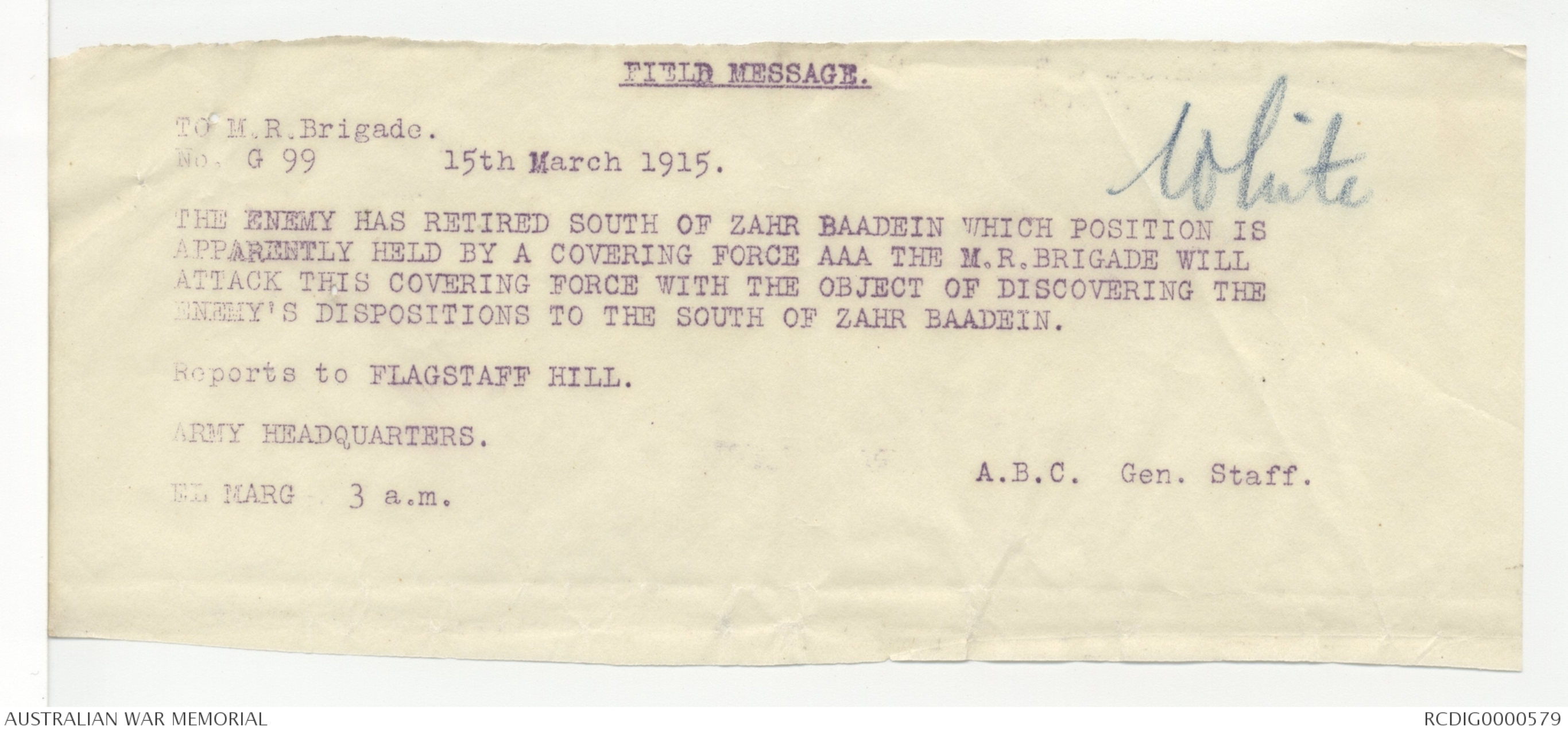
AUSTRALIAN AND NEW ZEALAND ARMY CORPS.
No. Ga 3010. Army Corps Headquarters,
Cairo. 10th March 1915.
From: Brigadier-General,
General Staff,
A. & N.Z.Army Corps.
To: General Officer Commanding,
New Zealand and Australian Division.
MEMORANDUM.
The following notes have been obtained from the
Intelligence Officer of an Army Corps in France, and are communicated
for the guidance of Divisional and Brigade Intelligence
Officers:-
(1) Correction of Maps.
Units must be called on to do this.
(2) Examination of prisoners.
Prisoners may be examined locally for tactical
information; but otherwise they should not be
questioned except by the General Staff Officers
whose duty it is to examine them.
(3) Great stress is laid on the early and continual
transmission of information.
(4) Intelligence Officers must learn the ground occupied by
our troops so that they can guide reinforcements
by day or night.
(5) A convenient means of supplying the troops with information regarding the enemy's forces, methods, etc.
is to issue a daily summary.
(6) When a halt, however short, gives the opportunity, roads, streams, bridges, etc. in the area should be tabulated
It is important to ascertain at every opportunity
water supplies, billeting possibilities, places where
columns can conveniently park off roads, obstacles xo
to movements of troops.
(sd) H.B. Walker,
Brig-General,
General Staff,
Australian & New Zealand Army Corps.
Battalion Inspections 9 & 11/3/15
Notes for Speeches to the men
First opportunity to address.
difficult for commander of 400 to get into personal touch.
Come to end of heavy training period.
Success of Coordinated action of 20,000 men & 10000 horses.
illustrated by night operation &c
Greatest encomium and taking part on equal terms.
Depends on Patience, Endurance, Self-Sacrifice
Small percentage of slackers & wasters
public opinion among the men themselves
I can't do it - you can.
Now lads, shortly going on active service
where or when don't know
told General on your behalf ready to go
anywhere & do anything.
May be faced with privations & hardships
sometimes hungry, often tired & miserable
That is what soldiering chiefly amounts to
Almost forgotten about war, & powerful unscrupulous, enemy.
Call on you with confidence to do your level best
for the sake of your manhood, for the sake of
Australia & for the sake of the British Empire.
AW
NOTES OF CONFERENCE OF THE G.O.C. DIVISION WITH ALL BRIGADIERS AND HIS STAFF,
AT DIVISIONAL HEADQUARTERS, ON 11-3-15.
------------------------------------------------------------
1. EMBARKATION. When allotment to transports is known, one or two trustworthy
Officers should be sent to each transport before any loading is done
so that he may ascertain and note where everything goes. The G.O.C. is
afraid that things will be shoved on board anyhow, vehicles being
separated from horses and horses from men. In the event of any delay
at Alexandria it will be necessary to make arrangements for the supply to
the men of coffee, tea, etc.; it would be a good idea to take cookers in advance
and provide for such extras out of regimental funds. A dry canteen
will, if possible, be established under Divisional arrangements, but the
G.O.C. prefers that any wet canteens should be established under Regimental
or Brigade arrangements. The Y.M.C.A. and Salvation Army will go with us
to the Overseas Base and their work is to be facilitated.
2. There will be a new issue of uniform available, but whether before
embarkation or after arrival at Overseas Base is not certain.
3. No Indian pattern or Tor tents are to be taken, only bell tents. All
requirements to make these substitutions are to be asked for at once.
4. Authority for expenditure by Brigadiers has not been asked in the past
as often as it should be, and the Q.M.G. was instructed to submit a claim scheme
to the G.O.C. under which Brigade Command ers would have authority to incur
expenditure up to a stated amount without reference to Divisional Headquarters.
5. Plenty of warm clothing and underclothing should be taken to the front.
6. The G.O.C. notes that Guards and Sentries are not up to the mark and that
tidiness in dress and precision in saluting is getting worse instead of
better.
7. To avoid abuses which are creeping in in various places, all Natives
are to be turned out of the lines except where Brigadiers are satisfied
there will be no danger of abuse.
8. During very hot weather horses left in the lines should if possible
be taken into the shed during the hottest hours.
9. Sam Browne belts and swords are to be taken to the Advanced Base.
In the field swords may be carried by Mounted Officers, but only on the
saddle. In all other cases they are to be left at the base. As orders
at present stand Officers are to carry revolvers, but the G.O.C. will be
very pleased if Officers fail to get an issue of revolvers.
10. Men left at the Advanced Base to look after regimental baggage should
be specially selected.
11. The Army Corps Commander wants as many men as possible to be taken to
the Advanced Base so that Units may move to the front at full War Establisment.
If the 2nd and 3rd Refts. for the Units of this Brigade arrive in
time they should be taken with us to the Advanced Base.
12. All ranks are to wear Field Service caps, but the hats will be retained
until we leave Egypt.
13. There is considerable doubt as to the correct place to carry the Field
Dressing; this will be decided and orders will be issued.
14. The iron ration is now available to be drawn and requisitions should be
sent in at once.
JM
NEW ZEALAND AND AUSTRALIAN DIVISION.
Headquarters,
Zeitoun Camp,
13th March 1915.
MEMORANDUM.
There are certain duties connected with Intelligence
work which cannot well be carried out during peace training, but
which are of greater importance in war, and in which Unit Commanders
must assist.
The following are the duties in question: –
(1) Checking of maps.
Units must assist in this by bringing to notice
any faults they find in the maps on which they are working.
(2) Preparation of sketches and reports.
The roughest sketch with notes and reference points
is often the quickest and clearest way of sending in a
report. Rough sketches and reports should be made as soon
as possible showing positions occupied and those of the
enemy in front, artillery positions, machine gun
positions, tactically important points, wire entanglements
trenches, etc. More accurate sketches should be
made as time and opportunity permit.
(3) Search of enemy for documents.
Prisoners should be searched, especially Officers,
before they have had time to get rid of any maps and
papers they may have about them. The enemy's dead must be
searched. All papers obtained from prisoners or from the
enemy's dead, will be forwarded to the General Staff. In
the case of wounded prisoners, the medical service is
responsible for this. (F.S.R. II, 115).
(4) Transmission of information.
The early transmission of information is of the utmost
importance. Every method must be used, as the signal
service is always hard worked.
WG Braithwaite
Lieut. -Colonel,
General Staff,
N.Z. & Australian Division.
13/3/15
NEW ZEALAND AND AUSTRALIAN DIVISION.
Headquarters,
Zeitoun Camp,
15th March, 1915.
HQ, 4th Aust Inf Bde
MEMORANDUM.
The attached "comments by Director of Operations on
12th March, 1915," on "Khaki" Force is forwarded for your
information.
WG Braithwaite
Lieut.–Colonel
General Staff,
N.Z. & Australian Division.
Brigadiers 2nd
COMMENTS BY DIRECTOR OF OPERATIONS.
12th March, 1915.
Advanced Guard.
1. In the orders given to Canterbury M. Rifles "two Squadrons
to advance in front, one squadron in reserve" the two squadrons
were ordered to cover front allotted in the scheme, but left
squadron was ordered to push forward and get its left on pt 210
(L-8) before this advance began. The result was a species of
parade movement. The whole movement could have been
simultaneous and quicker.
2. The advance of right squadron to Tower 2 was slow, in fact
at a walk, although the patrols had already been to that place.
3. The artillery with advanced guard were not used in a bold
enough way. To make good ground already held, sections or
single guns should have been boldly pushed forward, and
positions reconnoitred for more artillery, if required. As it
was the advance troops did not know where its supporting xx
artillery was, and therefore could not call on them at once when
wanted.
4. The advanced guard artillery must be ready to at once engage
any hostile artillery who are shelling the advanced troops.
This can only be done by pushing forward and being close in
touch.
5. In the advance of Main Body, the formation of the two
Infantry Brigades was quite different.
No.1 No.2
N.Z. Brigades. Each Battalion Australian Brigades
in fours small columns.
It was noticeable that the No. 1 formation took up more
ground, there was much more dust and I think would have been
easier for hostile artillery to range on.
NEW ZEALAND & AUSTRALIAN DIVISION
INTER-BRIGADE FIELD OPERATIONS.
Monday 15th March 1915
DIRECTOR: Major General Sir A. J. Godley K.C.M.G., C.B.
UMPIRE STAFF.
FOR WHITE FORCE.
CHIEF UMPIRE : Colonel J.H. Monash V.D.
For Auckland M.R : Lieut. Col. Burnage
" Canterbury M.R : Lieut. Col. Cannon
" Wellington M R : Lieut. Col. Pope
" 18 Pr. Battery. : I Officer F.A. Bde.
For BROWN FORCE :
CHIEF UMPIRE : Lieut. Col. G.W. Braithwaite D.S.O.
For 1st L.H. Regiment : Lieut. Col. Stewart
" 2nd L.H. " : Lieut. Col. Malone
." 3rd L.H. " : Lieut. Col. Moore D.S.O
" 18 Pr. Battery : 1 Officer. F.A. Bde.
The above Assistant Umpires will meet the
Chief Umpire at their respective rendezvous
¼ hour before the troops arrive.
Brown
NEW ZEALAND & AUSTRALIAN DIVISION.
INTER-BRIGADE FIELD OPERATIONS.
MONDAY, 15th March, 1915.
Reference Map of Egypt 1:50,000 MUDIRIA OALIUBIA, Sheet – Corrected 1914.
GENERAL IDEA.
NORTHLAND (WHITE) is at war with SOUTHLAND (BROWN).
SPECIAL IDEA (BROWN).
A severe battle took place yesterday, 14th March, about the SUEZ
ROAD between HELIOPOLIS and TOWER NO. 3. The morale of SOUTHLAND
was so shaken that it was necessary for the Main BROWN Army to
withdraw South of the Mokattam during the night 14th/15th March for
the purpose of re-organization. The following troops are ordered to
cover this movement.
BROWN FORCE.
Commander – Colonel H.G. Chauvel, C.M.G.
Troops. – Light Horse Brigade and one 18 pr Battery.
INSTRUCTIONS.
The BROWN FORCE will rendezvous at Zahr BAADEIN, Square G-14
at 7 a.m. on Monday, 15th March.
No one to be NORTH of a line drawn through KELAT ERRAI –
VIRGINS BREAST before 7.30 a.m., at which hour operations will
commence.
At the rendezvous Field Message No. G.88 is handed to the O.C.
by the Chief Umpire.
The opposing force will wear white hat bands.
10 rounds blank S.A.A. per rifle will be carried.
Casualty screens will be displayed.
Casualties are to be practised.
All 1st Line Transport is to be doublehorsed.
Two Ambulance Wagons, each drawn by six horses, are to
accompany the force.
Bayonets are not to be fixed, at any time during these
operations.
Opposing forces will not approach within 50 yards of each
other.
No operations are to take place EAST of the line I-J.
FIELD MESSAGE.
TO LIGHT HORSE BRIGADE
No, G 88 March 15. Brown
THE ENEMY RETIRED LAST NIGHT BEHIND AN ENTRENCHED POSITION
ON GEBEL DHAHER AAA ACCORDING TO RELIABLE INFORMATION REINFORCEMENTS
REACHED HIM DURING THE NIGHT, AND HE IS EXPECTED TO RENEW HIS ATTACK.
AAA MY CONCENTRATION IS NOT YET COMPLETE AAA IT IS MOST IMPORTANT
THAT YOU SHOULD CONTINUE TO HOLD THE ENEMY OFF AND SO PROTECT THE
PASSES THROUGH THE MOQATTAM.
Reports to .XXXXXXX. MAADI.
Army Headquarters,
MAADI 5 a.m.
X.Y.Z. General Staff.
FIELD MESSAGE.
TO M.R. Brigade.
No. G 99 15th March 1915. White
THE ENEMY HAS RETIRED SOUTH OF ZAHR BAADEIN WHICH POSITION IS
APPARENTLY HELD BY A COVERING FORCE AAA THE M.R. BRIGADE WILL
ATTACK THIS COVERING FORCE WITH THE OBJECT OF DISCOVERING THE
ENEMY'S DISPOSITIONS TO THE SOUTH OF ZAHR BAADEIN.
Reports to FLAGSTAFF HILL.
ARMY HEADQUARTERS.
A.B.C. Gen. Staff.
EL MARG 3 a.m.
 Jacqueline Kennedy
Jacqueline KennedyThis transcription item is now locked to you for editing. To release the lock either Save your changes or Cancel.
This lock will be automatically released after 60 minutes of inactivity.